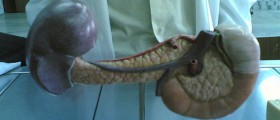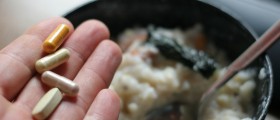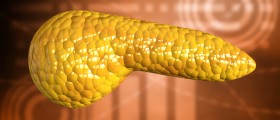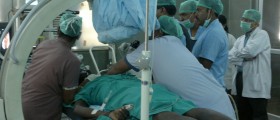Pancreas is a gland, located behind the stomach, in the abdominal cavity. This gland is considered to be part of both the endocrine and digestive systems. As the endocrine gland, the pancreas is responsible for the production of some important hormones in the human organism, such as insulin, somatostatin, and glucagon.
Pancreas also secretes pancreatic juice, which main ingredients are digestive enzymes. These pancreatic enzymes break down the fat, proteins, and carbohydrates from the food that we eat, helping the body to digest the food.

Pancreas Problems
Pancreatitis is a medical condition characterized by infection or inflammation of the pancreas. Different types of pancreatitis include pancreatic abscesses and acute and chronic pancreatitis.
When a person suffers from persistent pancreas inflammation that won’t heal for some time, doctors diagnose chronic pancreatitis. Without treatment, this condition progresses and may cause irreversible damage to the pancreas.
Digestive enzymes assault the pancreas and compromise its function, and the pancreas fails to produce adequate amounts of digestive enzymes. Scarring and functional problems also may cause difficulties with insulin production, leading to potential diabetes.
People suffering from chronic pancreatitis are usually treated in the hospital environment. Doctors will prescribe painkillers, intravenous hydration, and nutrition. Once a person starts with normal food, specialists will prescribe synthetic pancreas enzymes, to compensate for existing deficiencies in the body.
What to Eat With Pancreatitis
Patients suffering from pancreas inflammation are advised to make some changes in their everyday life, especially in their diet. A high-carbohydrate and low-fat diet are highly appreciated by these people. For more advice and a precise diet plan, it’s always best to consult your doctor and certified dietitian.
There are some suggestions on what to eat for each of your daily meals. For breakfast, eat cereals, cornflakes, oatmeal, bread, skimmed milk, or bananas. Lunch and dinner should consist of: soups, salads, chicken, tuna, beans, spaghetti, cooked vegetables, and some fruits. Eat small portions and get some light snacks during the day.
The recommended food also includes plenty of fluids: water and fruit juices, as well as liquefied meals. Try to combine soup with the stew and blend it together, because many pancreatitis patients claim that’s much easier to digest pureed food.
Use chicken and vegetable soups, and eat plenty of fruits, vegetables, rice, and soybeans. Lean-cooked meat is also a good choice if you are suffering from pancreatitis.
- The incidence of AP varies between 4.9 and 73.4 cases per 100.000 worldwide. The overall mortality ranges from 5%-20%, depending on severity of pancreatitis. The severity of this disease is classified as mild, moderately severe, or severe, according to the 2012 revised Atlanta classification.
- While the mortality rate is very low in mild pancreatitis (1%), there is a dramatic 30% increase in mortality in severe pancreatitis. Additionally, mortality can be up to 50% in extensive pancreatic necrosis and as high as 80% in patients with sepsis. AP is associated with a hospital length of stay of about 30 days and annual health-care cost of 2.6 billion in the United States.
- Nutrition intervention helps prevent malnutrition and is a key to reduce inflammation, complications, and death in acute pancreatitis. Current evidence supports the benefits of early enteral nutrition in severe pancreatitis.
- Energy requirement should be estimated with indirect calorimetry (IC) if possible, or 25 kcal/kg/d may be used as energy goal. Many non-static variables affect energy expenditure in severe pancreatitis, such as body temperature, volume status, and medications. These variables result in the poor accuracy of predictive equations. IC is the goal standard to determine energy expenditure, and thus IC measurement may help prevent over- or underfeeding. Estimated protein requirements are higher than healthy individuals (1.2-1.5 g/kg/d).
- Parenteral nutrition should be considered in patients who cannot tolerate enteral nutrition. According to recent data, nutritional supplements, including glutamine, probiotics, omega-3 fatty acids, and antioxidants, may contribute to positive outcomes.
- Probiotics may help improve gut integrity and immune function, and thus prevent bacterial translocation.
- Omega-3 fatty acids have shown beneficial anti-inflammatory effects and may improve systemic inflammation, multiorgan failure, and clinical outcomes in severe pancreatitis. A meta-analysis of 8 small RCTs demonstrated that the administration of omega-3 fatty acids was beneficial for reducing mortality, infectious complications, and length of hospital stay, especially when received parenterally.
- Antioxidants (vitamin A, vitamin C, vitamin E, selenium, and N-acetyl cysteine) may reduce inflammation and improve outcomes in severe pancreatitis.
Food to Avoid With Pancreatitis
There is some food you shouldn’t take while suffering from pancreatitis. This includes all large and heavy meals, fried and spicy food, red meat, butter, and margarine.
Chronic pancreatitis might also cause diabetes, and therefore you are advised to avoid very sweet desserts and concentrated sweets.
Alcohol and smoking are strictly forbidden.
Also, it would be very good for you to limit the consummation of caffeine and soda drinks, if you are suffering from pancreas inflammation.

















Your thoughts on this
Loading...